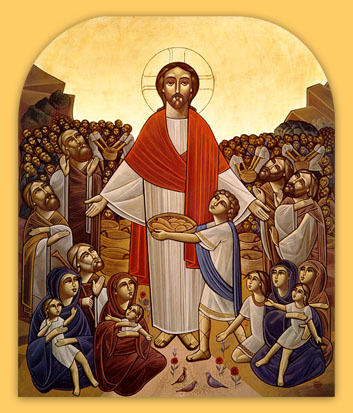Graced Effort
18th Sunday of the Year B (05Aug 2006)
Homily of Fr. Paul Panaretos, S.J.
As we enter further into the sixth chapter of John’s Gospel, traditional Catholic vocabulary can help us appreciate it. Many of us here recall our sacramental language includes the words matter and form. Sacraments are not abstract; they involve material things: water, bread, fire, oil, wine, to name some. To certain material things the Trinity gave a particular purpose: to communicate their life to humans. As the Fourth Gospel unfolds Jesus gave form, that is divine purpose, to water: I am the living water. In Cana, Jesus turned water into wine so families and friends could celebrate a wedding.1 At a pool at a Jerusalem gate, into which a lame man had no one help him, Jesus healed the man
and he walked.2
At Jacob’s well in Samaria, Jesus conversed with a woman about water and added he could give her living water.3 Not only would Jesus give her living water, Jesus offered it to everyone, “Let anyone who thirsts come to me and drink,”4 he said aloud in the temple. Today we heard Jesus give his new purpose—his shape or form—to bread, I am the living bread.
and he walked.2
At Jacob’s well in Samaria, Jesus conversed with a woman about water and added he could give her living water.3 Not only would Jesus give her living water, Jesus offered it to everyone, “Let anyone who thirsts come to me and drink,”4 he said aloud in the temple. Today we heard Jesus give his new purpose—his shape or form—to bread, I am the living bread.
The power to be living water, living bread flows from Jesus’ Spirit, the self-gift of Jesus to us and all humans. Indeed, that power is Jesus’ Spirit. Many tend to think outstanding vehicles—miracles, tongues, ecstatic experiences—carry and convey Holy Spirit. St. Paul reminded that humane living equally imparts Holy Spirit. Spirit-fruits are not alien, loud nor imposing, as St. Paul’s list indicates: The fruit of the Spirit is love, joy, peace, patience, kindness, generosity, faithfulness, gentleness and self-control.5
To put in action the fruit of the Spirit, or another way to say it, to live the pattern of Jesus’ life, takes effort. St. Paul knew that and reminded those he made part of the Messiah’s Body, the church. Using baptismal imagery, he reminded the Ephesians that effort is part of Christian living this side of heaven: put away the old self of your former way of life,...and be renewed in the spirit of your minds, and put on the new self, created in God’s way. In biblical language, mind meant more than the intellect. It included feelings, desires and purposes.
To put off and to put on new feelings as well as clean clothes takes effort. It takes effort to be in the world after the manner of Jesus. Catechumens, then and now, learn a new way to be in the world, namely to discover for themselves that Jesus’ dying and rising was not over and done with long ago. They learn before baptism, as each of us learns all through our Christian lives, that the power of Jesus’ risen life is for us—all of us, not our intellect only. In fact, making faith purely intellectual frustrates lifelong Catholics and even drives some away.
Faith in Jesus gives birth to a relationship with our Messiah. Like all relationships, our faith is more than a mental exercise. It involves our entire selves. What does one do? One accepts Messiah Jesus, welcomes him, longs for him like other relationships. We seek to make the pattern of Messiah Jesus’ life the pattern for our living. We know we live our Messiah’s way by the presence in our lives of the fruit of [his] Spirit: love, joy, peace, patience, kindness, generosity, faithfulness, gentleness and self-control.
Those ways may not be practiced often, but that doesn’t mean we ought to stop conditioning ourselves to practice them and to make them second nature to us. Living the pattern of our Messiah Jesus with our lives takes effort. That effort is, to use Catholic vocabulary, to make our aim and our purpose cooperating with grace, that is, divine life. The more we aim to welcome and cooperate with the gift of Jesus’ risen life given us, the more each of us discovers who the Trinity creates us to be. The more we become our true selves, that is, created in God’s way in righteousness and holiness of truth, our world enjoys more witnesses of the power of Jesus’ risen life.
In your daily 15 minutes with Jesus this week
- Rest in the Trinity, who creates you with a purpose.
- Ask the crowds who went looking for Jesus to present you to him.
- Praise Jesus for giving you life each moment.
- Ask him for grace to hunger for him and give you courage to replicate his pattern of living.
- Close saying slowing the Lord’s Prayer. As we say it slowly, we stop mouthing words; instead we grow to make Jesus’ way of living our way of living.
Link to this homily’s Spiritual Exercise
____________
____________________________________________________________________________
Wiki-image of Jesus feeding the multitude is in the public domain. Wiki-image by Davezelenka of baptism of Jesus used by CC BY-SA 3.0.


No comments:
Post a Comment